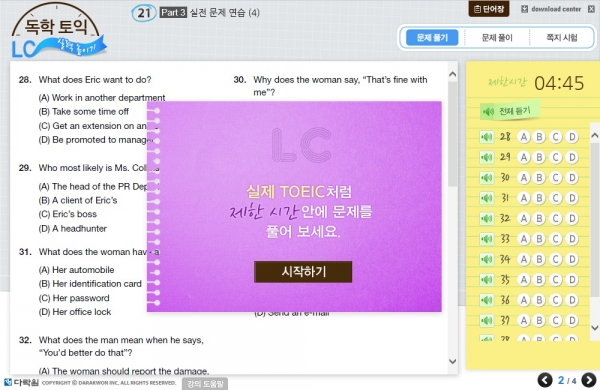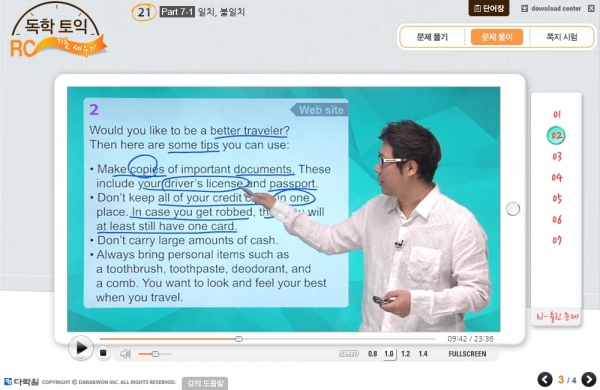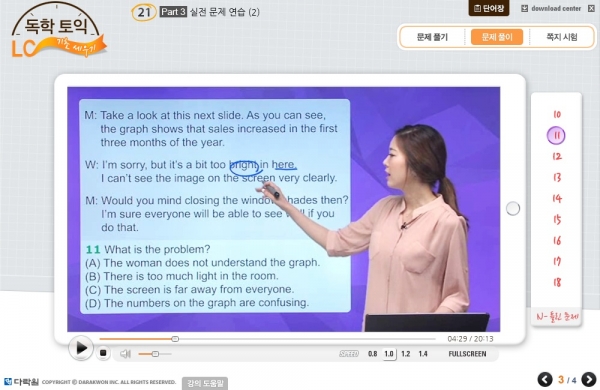-
- мҳҒм–ҙ
- Sel TEST
- English Hub
- Speaking TIP
- Culture Story
- Business Writing
- мқјліём–ҙ
- Sel TEST
- Japan Hub
- мӨ‘көӯм–ҙ
- Sel TEST
- Chinese Hub
- мӨ‘көӯ мөңмӢ лүҙмҠӨ
- The China+
- к·ёлҰ¬мҠӨм–ҙ
- л„ӨнҢ”м–ҙ
- лҸ…мқјм–ҙ
- лқјмҳӨмҠӨм–ҙ
- лҹ¬мӢңм•„м–ҙ
- лЈЁл§ҲлӢҲм•„м–ҙ
- лӘҪкіЁм–ҙ
- лҜём–Җл§Ҳм–ҙ
- л§җл Ҳмқҙм–ҙ
- лІ нҠёлӮЁм–ҙ
- лұ…кіЁм–ҙ
- л¶Ҳк°ҖлҰ¬м•„м–ҙ
- мҠӨмҷҖнһҗлҰ¬м–ҙ
- мҠӨнҺҳмқём–ҙ
- мӢұн• лқјм–ҙ
- м•„лһҚм–ҙ
- м•„лҘҙл©”лӢҲм•„м–ҙ
- м•„м ңлҘҙл°”мқҙмһ”м–ҙ
- м•”н•ҳлқјм–ҙ
- мҡ°лҘҙл‘җм–ҙ
- мҡ°мҰҲл°ұм–ҙ
- мҡ°нҒ¬лқјмқҙлӮҳм–ҙ
- мқҙлһҖм–ҙ
- мқҙнғҲлҰ¬м•„м–ҙ
- мқёлҸ„л„ӨмӢңм•„м–ҙ
- мІҙмҪ”м–ҙ
- мә„ліҙл””м•„м–ҙ
- нӮӨлҘҙкё°мҠӨм–ҙ
- м№ҙмһҗнқҗм–ҙ
- нғңкөӯм–ҙ
- н„°нӮӨм–ҙ
- нҲ¬лҘҙнҒ¬л§ӨлӢҲмҠӨнғ„м–ҙ
- нҸ¬лҘҙнҲ¬к°Ҳм–ҙ
- нҸҙлһҖл“ңм–ҙ
- н”„лһ‘мҠӨм–ҙ
- н—қк°ҖлҰ¬м–ҙ
- нһҢл””м–ҙ
- лЁјлӮҳлқј мқҙмӣғлӮҳлқј
-

Culture Story
кІҢмӢңкёҖ мҲҳ | 419
кҙҖл Ё к°•мўҢ мҲҳ | 169
- Bad English that Loses Business
- ECK | 2013.02.20 14:04
-
Bad English that Loses BusinessBefore you read: some questions to help you think about the topic and the words you might need.Have you heard about products that have bad English or some other language written on them? What was your experience?How important is it for the English (or other language) to be correct when exporting a product?A lot of cheap products from China are flooding the U.S. market and are being sold in dollar discount stores in the U.S.A. The government authorities in the U.S clamp down on false product claims, but not on bad English. Because these products are cheaply made, they are not well checked for quality. And so one of the problems facing consumers is the strange English labeling on them. For example, would you heed a label warning that says, вҖңThe people under 3 years old and over 60 are forbidden to eat alone?вҖқ The problem when labels are written in poor English is not only the confusion, but also it sends a message to consumers that this product will be defective and so canвҖҷt be trusted. If someone is paying only $1 then maybe they donвҖҷt really care, but if these companies want to be taken seriously then they need to look for some way to improve.So why do these products have such bad English (and maybe other languages too)? The problem is that many companies in China are overly confident of their English ability because they have someone who has some English, but is not a native speaker. This leads to many blunders, some are language blunders, but worse than this, some are cultural. Nobody wants to buy a game for their children that says, вҖңMake the stupid child be smartвҖқ. Another reason for the wrong English is that foreign suppliers will try to cut corners with programs such as Google Translator. If the labeling in products is bad enough then consumers will steer away from the product.Guessing meaning from context (the words around that word or phrase).Try to guess the meaning of the words in bold and match them with their closest meaning from the choices in the right. Some of the answers are very close and have similar meaning.The answers are below the table.
flooding the marketA1Difficult situations that people who buy things have to worry aboutclamp downB2To not do things well to achieve a result quicklyproblems facing consumersC3To control, to stop, to control with laws/regulationsheedD4Not work correctly, faultydefectiveE5Not kidding, something important that should be listened to or some action that must be followed or consideredto be taken seriouslyF6avoidblundersG7Advice to listen to and be careful of some danger, follow some warningcut cornersH8Mistakes, failuressteer awayI9A large number of products entering a place/country for sale
A=9, B=3, C=1, D=7, E=4, F=5, G=8, H=2, I=6Some example sentences using the new words to help you to better understand their meaning.1. Twelve years ago there were few cafes in Seoul, but now cafГ©s have flooded the market.2. The Korean government decided to clamp down on the amount of time that private academies could teach children.3. Five years ago one of the big problems facing car drivers was the high price of oil.4. The teacher told the students to heed her advice and study hard for the final exam.5. An A.S. (after sales service center) is where people can take their defective electronic products.6. You must take the speed limit sign seriously or you will receive a speeding ticket.7. The goal keeper blundered by jumping to the left and not the right and so a goal was scored by the opposing team.8. The computer was a failure because the manufacturers cut corners to save money by installing a cheaper memory chip.9. If you want to succeed in a negotiation you should steer away from accepting the first offer.Some discussion questions using the new words to help you better understand the word meaning and how to use them correctly. Try to use the words in your answer.1. How do you feel about cheap products flooding the market you live in? Do you have a similar experience to todayвҖҷs story?2. How much do you think your government should clamp down on cheap products?3. How much do you feel your government should control the import of defective products when these same products are very cheap?4. If you were a smaller Chinese manufacturer with this English problem, what would you do so that your product would be taken seriously?5. If you were importing products from China then what advice should you heed? (what problems could you have?)6. From the reading, why would people not take a product seriously if they see very poor English on the label?7. Do you know any other cultural blunders that people have made when trying to sell products to other countries? What blunders do you think companies need to be careful about?8. What product companies should not cut corners? Why?9. What other reasons would customers steer away from a product?
- 추мІңк°•мўҢ























